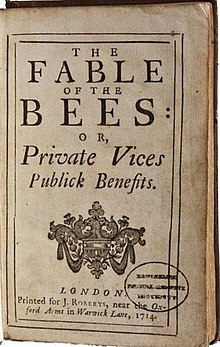From Wikipedia, the free encyclopedia
https://en.wikipedia.org/wiki/The_Fable_of_the_Bees
The title page of the 1714 edition of Mandeville's Fable of the Bees
The Fable of The Bees: or, Private Vices, Publick Benefits (1714) is a book by the Anglo-Dutch social philosopher Bernard Mandeville. It consists of the satirical poem The Grumbling Hive: or, Knaves turn'd Honest, which was first published anonymously in 1705; a prose discussion of the poem, called "Remarks"; and an essay, An Enquiry into the Origin of Moral Virtue. In 1723 a second edition was published with two new essays.
In The Grumbling Hive, Mandeville describes a bee
community that thrives until the bees decide to live by honesty and
virtue. As they abandon their desire for personal gain, the economy of
their hive collapses, and they go on to live simple, "virtuous" lives in
a hollow tree. Mandeville's implication—that private vices create social benefits—caused a scandal when public attention turned to the work, especially after its 1723 edition.
Mandeville's social theory
and the thesis of the book, according to E. J. Hundert, is that
"contemporary society is an aggregation of self-interested individuals
necessarily bound to one another neither by their shared civic
commitments nor their moral rectitude, but, paradoxically, by the
tenuous bonds of envy, competition and exploitation". Mandeville implied that people were hypocrites
for espousing rigorous ideas about virtue and vice while they failed to
act according to those beliefs in their private lives. He observed that
those preaching against vice had no qualms about benefiting from it in
the form of their society's overall wealth, which Mandeville saw as the
cumulative result of individual vices (such as luxury, gambling, and
crime, which benefited lawyers and the justice system).
Mandeville's challenge to the popular idea of virtue—in which only unselfish, Christian behaviour was virtuous—caused a controversy that lasted through the eighteenth century and influenced thinkers in moral philosophy and economics. The Fable influenced ideas about the division of labour and the free market (laissez-faire), and the philosophy of utilitarianism was advanced as Mandeville's critics, in defending their views of virtue, also altered them. His work influenced Scottish Enlightenment thinkers such as Francis Hutcheson, David Hume, and Adam Smith.
Publication history
The genesis of The Fable of the Bees was Mandeville's anonymous publication of the poem The Grumbling Hive: or, Knaves Turn'd Honest on 2 April 1705 as a sixpenny quarto, which was also pirated at a half-penny. In 1714, the poem was included in The Fable of the Bees: or, Private Vices, Publick Benefits, also published anonymously. This book included a commentary, An Enquiry into the Origin of Moral Virtue, and twenty "Remarks". The second edition in 1723 sold at five shillings and included two new parts: An Essay on Charity and Charity-Schools and A Search into the Nature of Society.
This edition attracted the most interest and notoriety. Beginning with
the 1724 edition Mandeville included a "Vindication", first published in
the London Journal, as a response to his critics.
Between 1724 and 1732, further editions were published, with changes
limited to matters of style, slight alterations of wording, and a few
new pages of preface. During this period, Mandeville worked on a "Part
II", which consisted of six dialogs and was published in 1729 as The Fable of the Bees. Part II. By the Author of the First.
A French translation was published in 1740. The translation, by
the Swiss J. Bertrand, was not particularly faithful to the original;
according to Kaye, it was "a free one, in which the Rabelaisian element in Mandeville was toned down". By this time, French literati were familiar with Mandeville from the 1722 translation by Justus van Effen of his Free Thoughts on Religion, the Church and National Happiness. They had also followed the Fable's scandal in England. The book was especially popular in France between 1740 and 1770. It influenced Jean-François Melon and Voltaire, who had been exposed to the work in England between 1726 and 1729 and reflected on some of its ideas in his 1736 poem Le Mondain. A German translation first appeared in 1761.
F. B. Kaye's 1924 edition, based on his Yale dissertation and published by Oxford University's Clarendon Press, included extensive commentary and textual criticism. It renewed interest in the Fable, whose popularity had faded through the 19th century. Kaye's edition, a "model of what a fully annotated edition ought to be" and still important to Mandeville studies, was reprinted in 1988 by the American Liberty Fund.
Synopsis
Poem
The Grumbling Hive: or, Knaves turn'd Honest (1705) is in doggerel couplets of eight syllables over 433 lines. It was a commentary on contemporary English society as Mandeville saw it. Economist John Maynard Keynes
described the poem as setting forth "the appalling plight of a
prosperous community in which all the citizens suddenly take it into
their heads to abandon luxurious living, and the State to cut down
armaments, in the interests of Saving". It begins:
- A Spacious Hive well stock'd with Bees,
- That lived in Luxury and Ease;
- And yet as fam'd for Laws and Arms,
- As yielding large and early Swarms;
- Was counted the great Nursery 5
- Of Sciences and Industry.
- No Bees had better Government,
- More Fickleness, or less Content.
- They were not Slaves to Tyranny,
- Nor ruled by wild Democracy; 10
- But Kings, that could not wrong, because
- Their Power was circumscrib'd by Laws.
The "hive" is corrupt but prosperous, yet it grumbles about lack of
virtue. A higher power decides to give them what they ask for:
- But Jove, with Indignation moved,
- At last in Anger swore, he'd rid 230
- The bawling Hive of Fraud, and did.
- The very Moment it departs,
- And Honesty fills all their Hearts;
This results in a rapid loss of prosperity, though the newly virtuous hive does not mind:
- For many Thousand Bees were lost.
- Hard'ned with Toils, and Exercise
- They counted Ease it self a Vice;
- Which so improved their Temperance; 405
- That, to avoid Extravagance,
- They flew into a hollow Tree,
- Blest with Content and Honesty.
The poem ends in a famous phrase:
- Bare Virtue can't make Nations live
- In Splendor; they, that would revive
- A Golden Age, must be as free,
- For Acorns, as for Honesty.
Charity schools
In the 1723 edition, Mandeville added An Essay on Charity and Charity-Schools. He criticised charity schools,
which were designed to educate the poor and, in doing so, instil virtue
in them. Mandeville disagreed with the idea that education encourages
virtue because he did not believe that evil desires existed only in the
poor; rather he saw the educated and wealthy as much more crafty.
Mandeville believed that educating the poor increased their desires for
material things, defeating the purpose of the school and making it more
difficult to provide for them.
Contemporary reception
At the time, the book was considered scandalous, being understood as an attack on Christian virtues.
The 1723 edition gained a notoriety that previous editions had not, and
caused debate among men of letters throughout the eighteenth century.
The popularity of the second edition in 1723 in particular has been
attributed to the collapse of the South Sea Bubble
a few years earlier. For those investors who had lost money in the
collapse and related fraud, Mandeville's pronouncements about private
vice leading to public benefit would have been infuriating.
The book was vigorously combatted by, among others, the philosopher George Berkeley and the priest William Law. Berkeley attacked it in the second dialogue of his Alciphron (1732). The 1723 edition was presented as a nuisance by the Grand Jury of Middlesex, who proclaimed that the purpose of the Fable
was to "run down Religion and Virtue as prejudicial to Society, and
detrimental to the State; and to recommend Luxury, Avarice, Pride, and
all vices, as being necessary to Public Welfare, and not tending to the Destruction of the Constitution". In the rhetoric of the presentment, Mandeville saw the influence of the Society for the Reformation of Manners. The book was also denounced in the London Journal.
Other writers attacked the Fable, notably Archibald Campbell (1691–1756) in his Aretelogia. Francis Hutcheson also denounced Mandeville, initially declaring the Fable
to be "unanswerable"―that is, too absurd for comment. Hutcheson argued
that pleasure consisted in "affection to fellow creatures", and not the
hedonistic pursuit of bodily pleasures. He also disagreed with
Mandeville's notion of luxury, which he believed depended on too austere a notion of virtue. The modern economist John Maynard Keynes noted that "only one man is recorded as having spoken a good word for it, namely Dr. Johnson, who declared that it did not puzzle him, but 'opened his eyes into real life very much'."
The book reached Denmark by 1748, where a major Scandinavian writer of the period, Ludvig Holberg (1684–1754), offered a new critique of the Fable—one that did not centre on "ethical considerations or Christian dogma".
Instead, Holberg questioned Mandeville's assumptions about the
constitution of a good or flourishing society: "the question is whether
or not a society can be called luxurious in which citizens amass great
wealth which is theirs to use while others live in the deepest poverty.
Such is the general condition in all the so-called flourishing cities
which are reputed to be the crown jewels of the earth."
Holberg rejected Mandeville's ideas about human nature—that such
unequal states are inevitable because humans have an animal-like or
corrupt nature—by offering the example of Sparta,
the Ancient Greek city-state. The people of Sparta were said to have
rigorous, immaterialistic ideals, and Holberg wrote that Sparta was
strong because of this system of virtue: "She was free from internal
unrest because there was no material wealth to give rise to quarrels.
She was respected and honored for her impartiality and justice. She
achieved dominion over the other Greeks simply because she rejected
dominion."
Jean-Jacques Rousseau commented on the Fable in his Discourse on the Origin and Basis of Inequality Among Men (1754):
Mandeville sensed very well that even with all their
morality men would never have been anything but monsters if nature had
not given them pity in support of reason; but he did not see that from
this quality alone flow all the social virtues he wants to question in
men. In fact, what are generosity, clemency, humanity, if not pity
applied to the weak, to the guilty, to the human species in general?
In the 19th century, Leslie Stephen, writing for the Dictionary of National Biography
reported that "Mandeville gave great offense by this book, in which a
cynical system of morality was made attractive by ingenious paradoxes.
... His doctrine that prosperity was increased by expenditure rather
than by saving fell in with many current economic fallacies not yet
extinct.
Assuming with the ascetics that human desires were essentially evil and
therefore produced 'private vices' and assuming with the common view
that wealth was a 'public benefit', he easily showed that all
civilization implied the development of vicious propensities.
Analysis
As a satire, the poem and commentary point out the hypocrisy of men who promulgate ideas about virtue while their private acts are vices. The degree to which Mandeville's "rigoristic" definitions of virtue and vice
followed those of English society as a whole has been debated by
scholars. Kaye suggests that two related concepts of vice are at play in
Mandeville's formulation. Christianity taught that a virtuous act was
unselfish, and the philosophy of Deism suggested that the use of reason
was virtuous because it would naturally reveal theological truth.
Mandeville looked for acts of public virtue and could not find them, yet
observed that some actions (which must then be vices) led to beneficial
outcomes in society, such as a prosperous state. This was Mandeville's
paradox, as embedded in the book's subtitle: "Private Vices, Publick
Benefits".
Mandeville was interested in human nature, and his conclusions
about it were extreme and scandalous to 18th-century Europeans. He saw
humans and animals as fundamentally the same: in a state of nature, both
behave according to their passions or basic desires. Man was different,
though, in that he could learn to see himself through others' eyes, and
thus modify his behaviour if there were a social reward for doing so.
In this light Mandeville wrote of the method by which the selfish
instincts of "savage man" had been subdued by the political organization
of society. It was in the interest of those who had selfish motives, he
argued, to preach virtuous behavior to others:
It being the Interest then of the
very worst of them, more than any, to preach up Publick-spiritedness,
that they might reap the Fruits of the Labour and Self-denial of others,
and at the same time indulge their own Appetites with less disturbance,
they agreed with the rest, to call every thing, which, without Regard
to the Publick, Man should commit to gratify any of his Appetites, VICE;
if in that Action there cou'd be observed the least prospect, that it
might either be injurious to any of the Society, or ever render himself
less serviceable to others: And to give the Name of VIRTUE to every
Performance, by which Man, contrary to the impulse of Nature, should
endeavour the Benefit of others, or the Conquest of his own Passions out
of a Rational Ambition of being good.
To critics it appeared that Mandeville was promoting vice, but this was not his intention. He said that he wanted to "pull off the disguises of artful men" and expose "the hidden strings" that guided human behaviour.
Nevertheless he was seen as a "modern defender of licentiousness", and
talk of "private vices" and "public benefits" was common among the
educated public in England.
As literature
Less
attention has been paid to the literary qualities of Mandeville's book
than to his argument. Kaye called the book "possessed of such
extraordinary literary merit" but focused his commentary on its implications for moral philosophy, economics, and utilitarianism. Harry L. Jones wrote in 1960 that the Fable
"is a work having little or no merit as literature; it is a doggerel,
pure and simple, and it deserves no discussion of those aspects of form
by which art can be classified as art".
Economic views
Mandeville is today generally regarded as a serious economist and philosopher. His second volume of The Fable of the Bees in 1729 was a set of six dialogs that elaborated on his socio-economic views. His ideas about the division of labor draw on those of William Petty, and are similar to those of Adam Smith. Mandeville says:
When once Men come to be govern’d
by written Laws, all the rest comes on a-pace. Now Property, and Safety
of Life and Limb, may be secured: This naturally will forward the Love
of Peace, and make it spread. No number of Men, when once they enjoy
Quiet, and no Man needs to fear his Neighbour, will be long without
learning to divide and subdivide their Labour...
Man, as I have hinted before, naturally loves to imitate what he
sees others do, which is the reason that savage People all do the same
thing: This hinders them from meliorating their Condition, though they
are always wishing for it: But if one will wholly apply himself to the
making of Bows and Arrows, whilst another provides Food, a third builds
Huts, a fourth makes Garments, and a fifth Utensils, they not only
become useful to one another, but the Callings and Employments
themselves will in the same Number of Years receive much greater
Improvements, than if all had been promiscuously follow’d by every one
of the Five...
The truth of what you say is in nothing so conspicuous, as it is in
Watch-making, which is come to a higher degree of Perfection, than it
would have been arrived at yet, if the whole had always remain'd the
Employment of one Person; and I am persuaded, that even the Plenty we
have of Clocks and Watches, as well as the Exactness and Beauty they may
be made of, are chiefly owing to the Division that has been made of
that Art into many Branches.
The poem suggests many key principles of economic thought, including division of labor and the "invisible hand", seventy years before these concepts were more thoroughly elucidated by Adam Smith. Two centuries later, John Maynard Keynes
cited Mandeville to show that it was "no new thing ... to ascribe the
evils of unemployment to ... the insufficiency of the propensity to
consume", a condition also known as the paradox of thrift, which was central to his own theory of effective demand.











